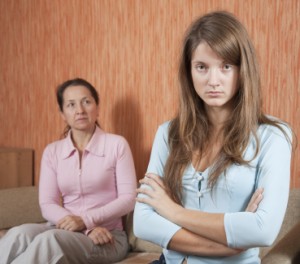|
|
February 7, 2011
 Hey Cupid, I'm waiting... One week ’til Valentine’s Day. Non-stop teen emails scream for my attention and romantic advice. Not sure how I became such an expert. I mean, honestly, if some fortune teller sidled up to me in 7th grade and whispered “Some day, Annie, you will be a relationship guru sought after by thousands for your expansive knowledge of love,” I’d have choked on my incredulity then looked around to see which of the Popular Girls was messing with me.
But that was then and now apparently people actually believe I know something about love and the rest of it. Here are some questions from recent seekers:
Hey Terra,
My best friend has a great boyfriend. I’m happy for her, but I’m also extremely jealous and I feel like I can’t find anyone. I’m definitely not ugly. I’m pretty, smart, funny, easygoing and friendly. But why is it that I can’t find a nice guy who is interested in me?!
Lonely Beauty
Dear LB….
_____
Hey Terra,
Any guy I crush over does not feel the same about me. They always have a reason why I’m not “The One.” What can I do to get guys to like me???
Desperate
Dear Desperate...
And just so you don’t get the impression these are exclusively “girl” issue, check out these poignant queries from guys:
Hey Terra,
Whenever I see this girl that I’m really in love with I freeze up and don’t know what to say. I would do anything in my power for her. Can you please give me some tips on what to say to her? I would really appreciate it.
Freeze up Dude
Dear Dude…
_____
Hey Terra,
I’m 15 and I really want to be with someone and share feelings and secrets and also we can support each other. The problem is that I’m not a popular guy and I’m rejected by many people at school (I used to get picked on and bullied for no reason). I’ve asked girls out a couple of times but they all rejected me.
Still Single
Dear Still Single…
If one of these kids were your son or daughter of course you’d want to ease their suffering, but how? First with the recognition that we’ve all been there. Too shy to talk to a crush and frustrated by our own boundless ineptitude. Lonely. Desperate to be part of a couple. Crazy jealous of a friend who had a bf/gf. Then there was the inescapable fear that no one would fall in love with us… ever!
If Valentine’s Day is bringing your kid down, try to be empathetic. Take the lead and open a respectful conversation about it. This could be a great opportunity to show some compassion and understanding. That’s going to make your child feel better while it strengthens your bond. Please do not joke about, trivialize or invalidate their pain. Teen angst is real and it hurts.
So remember your kid this Monday. You’re not the love of his or her life, or a close substitute, but when they’re feeling unloved or unlovable (like Freeze Up Dude and the gang) it’s nice to know that Mom or Dad cares.
On a personal note: My father never forgot me on Valentine’s Day. His thoughtfulness was especially important during my “Everyone’s got a boyfriend but me” phase. I knew Dad loved me and that counted a lot. He died suddenly when I was 15 and I still smile at the memory of a tiny bottle of L’Air Du Temps he gave me on Valentine’s Day when I was 12.

January 30, 2011
 The classic standoff Clinical research shows the hairs on the heads of parents of teens get noticeably grayer on Friday and Saturday nights. (Assuming previous teen shenanigans haven’t already caused you to pull out all of yours.) I probably should have written this blog on Thursday so you’d have it in advance of the weekend. But no worries. There’s no expiration date on advice for dealing with a teen’s poor judgment. If you don’t need this now, save it. It’ll come in handy sooner or later.
I recently got an email from Distraught Parent describing how Teen Daughter had purportedly gone to a friend’s sleepover (Just us girls). In the wee hours of the Saturday AM Parent receives call from local law enforcement reporting that Daughter and two equally Clueless Friends have been picked up riding in car driven by Drunk Teen Boy. Daughter comes home, announces: “I don’t want to talk about it!” and proceeds to sleep for the rest of the day. Parent describes how Daughter’s had a “rough” semester, has been “sad” for months and how her grades have plummeted from A’s to C’s. What to do??
Here’s my reply:
I’m relieved to hear your daughter’s choice to ride with a drunk driver didn’t end in tragedy for her or anyone else. I’m sure you are too! Sounds like something’s been going on with her for a while and this is the capper. (So far!)
Yesterday she didn’t want to talk and that’s OK for yesterday. It’s not an option for today.
She needs to talk and you need listen. (I mean really listen.) If you lay into her with The Lecture she’s going to shut down. She knows she blew it, but the real question is WHAT’S GOING??
Have the fact-finding conversation today. Let her know how you felt when you got the 4 AM call. Let her know that your TRUST in her honesty, her ability to make good choices and to keep herself safe has been shredded. Let her know that you know things haven’t been easy for her lately. Let her know you love her and it’s your job to keep her safe and to help her sort through the challenges she’s facing. Let her know she can talk to you anytime and that you will NOT throw anything she tells back in her face.
Do your best to help her figure out why certain choices she’s making aren’t in her own best interest. That’s the best you can work towards. You are her mentor, teacher and guide but you can’t live her life for her.
Your daughter deserves a meaningful consequence for her irresponsible and dangerous choice on Friday night. And you both deserve some professional help in rebuilding the trust and improving the communication between you.
Like I said at the top, teens aren’t known for their prescient decision-making. In the best of situations, their “still-under-construction” brains often works against them. Add alcohol/drugs, sexual tension, peer pressure, sleep deprivation and a whole host of other stressors and it’s tough for them to do the right thing, which often includes resisting the wrong thing!
The more we calm down, tune in to our teens and listen to them attentively and compassionately, the more likely they’ll let us know the kind of support they need from us during a rough semester and beyond.

November 12, 2010
The following parent’s “pledge” was originally written for and posted on SafetyWeb.com. SafetyWeb is a thoughtfully designed tool that provides parents with a means and a context for ongoing family conversations about safety, friendship and how the choices we make, online and off, have consequences.
 FOAD!! 3 out of 4 t(w)eens regularly use social media. (UPDATE Oct. 2013: The proportion of teens who say they don’t use social networks fell from 6% earlier this year to 2% the latest survey reports.) While the young ‘uns are scary good at navigating the tech, when it comes to connecting the dots between their digital choices and the resulting social consequences, most of them are clueless. If your kid has a cellphone and access to the Internet it’s up to you to teach them how to behave.
Q: If you don’t, who will?
A: Their equally clueless friends.
As a parent, I pledge to do the following to raise a responsible Netcitizen and teach my child about online safety:
- Social media is part of my child’s world. As a Safety Conscious Digital Parent, I pledge to do my best to raise my child to be a responsible digital citizen.
- I pledge to support my child’s use of age-appropriate social networking sites and to teach my child how to play safe and stay safe online so (s)he can grow in positive ways from online activities.
- I pledge to teach my child the difference between what is and what is not responsible and appropriate online behavior. That includes teaching my child the best ways to respond to anything online that makes him/her uncomfortable, angry or scared.
- I pledge to help my child understand the risks of giving out or posting personal information publicly online. (including photos, age, last name, name of school, home address, phone number.)
- Digitally-savvy kids’ “status anxiety” (their need to be accepted) affects their online behavior. My child has the right to choose his/her friends, but not the right to demean, harass or intimidate others. I pledge to make sure (s)he gets this message and acts accordingly.
- I pledge to have open, respectful dialogues with my child about how (s)he uses the services I give her access to online. When my child messes up (it’ll happen), I pledge to use the opportunity to teach him/her more socially acceptable behavior.
- I pledge to help my child discern between a true friend and someone with bad intentions, so that (s)he can use good judgment regarding online “friends,” as well as his/her own behavior.
- I pledge to educate my child on how their public online activity leaves a lasting digital footprint that teachers, college admissions officers, or future employers may see.
- I pledge to help my child understand the implications of online behavior so that my child can maintain his/her privacy, safety and good reputation while we keep a healthy, trusting and mutually respectful relationship between us.
You don’t need me to tell you why this stuff is import. So… can we all count on each other to do this?

October 30, 2010
This article was originally written for and posted on SafetyWeb.com. SafetyWeb is a thoughtfully designed tool that provides parents with a means and a context for ongoing family conversations about safety, friendship and how the choices we make, online and off, have consequences.
 Thanks for respecting me, Mom. If your kids are 11-17, congrats! You’ve made it to the Major League of parenting. With little ones, you didn’t need fancy plays since you called all the shots. Now there’s often grumbling in the bullpen and effective parenting is all about nuance and negotiation.
As t(w)eens step up and make more of their own decisions, parents need to gradually step back. But your job’s not done yet! Kids still need us to be plugged in and monitoring their physical, social and emotional well-being. With 3/4 of middle and high school students actively engaged in social media, they need us more than ever.
But when does conscientious monitoring of young digital citizens cross the line and become disrespectful and intrusive? Good question! Hold that thought.
Just for the record, if you’ve got evidence or a vague sense that your child is engaging in harmful activities or is being hurt, threatened or harassed, monitor the situation very closely. Act on your gut. Question your kid at length. Tell what you know, suspect and fear. Dig deep and don’t give up until you get to the bottom of what’s going on. Then offer your strongest support, providing your child the help (s)he needs and follow up!
But what if nothing’s going on? How closely should you monitor then? I often hear from good, drug-free kids, who get excellent grades. They’re indignant because Mom/Dad snoop through their email and cell phones for no known reason. They’re exhausted by a so-called Velcro parent who can’t let go and constantly texts and phones their kids all the day.
In case you’re thinking: “I have the right to check in with my kid whenever I want and to know everything my kid’s doing at all times!” With all due respect, if you don’t have probable cause for poking into the personal exchanges your kids have with their peers, you shouldn’t. All kids, especially teens, have the right to a degree of privacy.
How much privacy? How much freedom? At what age? Depends. I don’t know your child or his track record for making responsible choices when you’re not around. Besides, parenting isn’t a science, it’s an art. We’re all artists, trying to figure out how to use our tools to launch a masterpiece, i.e., a fully functioning young adult. Unfortunately, there are no easy answers. But the most effective parents create and maintain healthy boundaries with their kids.
In 21st Century parent-speak the word “boundaries” often means “rules.” As in: Parents set up the rules and the kids (hopefully) comply. This top-down, one-way approach can lead to rebellion in the ranks. Family rules are part of any discussion of boundaries, but the fact is, healthy boundaries are a two-way street. Our personal boundaries deserve respect and so do our kids’. For example:
You politely inform your 13 year old she can’t go out with her friends because she didn’t keep her agreement to finish her homework first. Furious, she blasts you with a choice sampling from her name-calling inventory. Boundary alert! Your daughter disrespected you. She deserves a consequence from you so she doesn’t think for one minute that her behavior was acceptable.
Your 14 year old mumbles something about Coach being a “jerk” for not letting the boy start in tomorrow’s game. Incensed, you grab your phone. Your son shouts, “Don’t! I’ll handle it!” Ignoring him, you call Coach and give the “jerk” an earful. Double Boundary alert! By disregarding your son’s wishes, you disrespected him. You also rudely overstepped your parenting role by intervening between coach and student.
We all want our kids’ respect. That’s why we’ve got to hold them accountable for respecting our boundaries. While we’re at it, we need to respect their boundaries too. Great advice, though not always easy to follow. But like I said, parenting is an art… you’ve got to practice to improve. Besides, we’re not looking for perfection, just progress.
 — Older Posts »
| |















